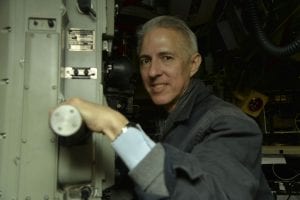Nuclear Sub Visit Opens New Opportunities For Physics, Engineering Students

From left: Dr. Sam Richie, Anthropology alumnus Brian Smith and Dr. Robert Peale. (Photo Courtesy U.S Navy)
A recent trip to San Diego by two UCF professors sets up new opportunities for students interested in nuclear physics.
Both Physics and Engineering were represented on the visit to the U.S. Navy’s submarine base, with Robert Peale, Ph.D., representing the former, and Sam Richie, Ph.D., bringing the Engineering perspective. The pair headed home to Orlando with big ideas on how encourage students to consider pursuing a military career.
“I was struck first by the level of professionalism, especially among the young sailors. They were operating at a level that was far higher than their age,” Peale said.
That professionalism followed them on every stop of their visit, from a nuclear-powered aircraft carrier to the training simulator that keeps submarine operators sharp.
While working for the Navy — either in uniform or as a civilian — isn’t ideal for every student, Peale said there are several factors that could appeal to a certain niche of student. In Peale’s experience, students are increasingly working two or more jobs to make ends meet and their education suffers as a result. The Navy answers their own workforce demands by financially supporting students’ education through the Nuclear Propulsion Officer Candidate program. All majors are eligible for the program, but a year of calculus and calculus-based physics are required. The rigid rules and discipline endemic to the military workforce can also help students searching for structure.

Richie discovered the benefits go both ways.
“UCF is an ideal recruitment pool for hiring electrical and computer engineers,” Richie said. “Our undergrads represent a highly diverse, high-quality group of students.”
Richie’s favorable impression of the Navy program will shape his future interactions with electrical and computer engineering juniors and seniors. More visits from recruiters are in the works, as well as future internships and fellowships. That’s really where you find your purpose, Peale said.
“When you’re just solving problems and reading books at school, you’re not really doing the work of a physicist,” Peale said. “When you’re exposed to the realities of the work, you can discover whether you have an aptitude for it.”
